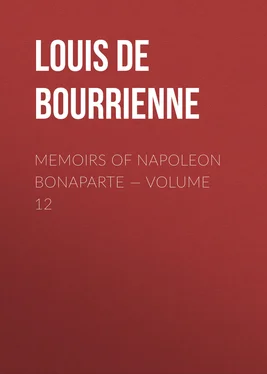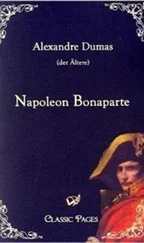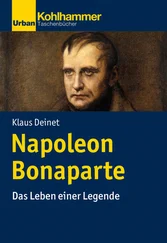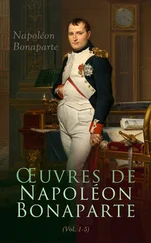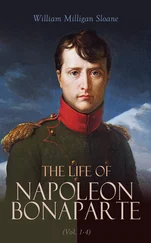Louis Bourrienne - Memoirs of Napoleon Bonaparte — Volume 12
Здесь есть возможность читать онлайн «Louis Bourrienne - Memoirs of Napoleon Bonaparte — Volume 12» — ознакомительный отрывок электронной книги совершенно бесплатно, а после прочтения отрывка купить полную версию. В некоторых случаях можно слушать аудио, скачать через торрент в формате fb2 и присутствует краткое содержание. Жанр: Биографии и Мемуары, История, foreign_edu, foreign_antique, foreign_prose, на английском языке. Описание произведения, (предисловие) а так же отзывы посетителей доступны на портале библиотеки ЛибКат.
- Название:Memoirs of Napoleon Bonaparte — Volume 12
- Автор:
- Жанр:
- Год:неизвестен
- ISBN:нет данных
- Рейтинг книги:5 / 5. Голосов: 1
-
Избранное:Добавить в избранное
- Отзывы:
-
Ваша оценка:
- 100
- 1
- 2
- 3
- 4
- 5
Memoirs of Napoleon Bonaparte — Volume 12: краткое содержание, описание и аннотация
Предлагаем к чтению аннотацию, описание, краткое содержание или предисловие (зависит от того, что написал сам автор книги «Memoirs of Napoleon Bonaparte — Volume 12»). Если вы не нашли необходимую информацию о книге — напишите в комментариях, мы постараемся отыскать её.
Memoirs of Napoleon Bonaparte — Volume 12 — читать онлайн ознакомительный отрывок
Ниже представлен текст книги, разбитый по страницам. Система сохранения места последней прочитанной страницы, позволяет с удобством читать онлайн бесплатно книгу «Memoirs of Napoleon Bonaparte — Volume 12», без необходимости каждый раз заново искать на чём Вы остановились. Поставьте закладку, и сможете в любой момент перейти на страницу, на которой закончили чтение.
Интервал:
Закладка:
CHAPTER XXIX
1813.
Napoleon's second visit to Dresden—Battle of Bantzen—The Congress at Prague—Napoleon ill advised—Battle of Vittoria—General Moreau Rupture of the conferences at Prague—Defection of Jomini—Battles of Dresden and Leipsic—Account of the death of Duroc—An interrupted conversation resumed a year after—Particulars respecting Poniatowski—His extraordinary courage and death— His monument at Leipsic and tomb in the cathedral of Warsaw.
On the 2d of May Napoleon won the battle of Lutzen. A week after he was at Dresden, not as on his departure for the Russian campaign, like the Sovereign of the West surrounded by his mighty vassals: he was now in the capital of the only one of the monarchs of his creation who remained faithful to the French cause, and whose good faith eventually cost him half his dominions. The Emperor stayed only ten days in Dresden, and then went in pursuit of the Russian army, which he came up with on the 19th, at Bautzen. This battle, which was followed on the two succeeding days by the battles of Wurtchen and Oclikirchen, may be said to have lasted three days—a sufficient proof that it was obstinately disputed. It ended in favour of Napoleon, but he and France paid dearly for it: while General Kirschner and Duroc were talking together the former was killed by a cannon-ball, which mortally wounded the latter in the abdomen.
The moment had now arrived for Austria to prove whether or not she. intended entirely to desert the cause of Napoleon.
—[There is a running attack in Erreurs (tome, ii. pp, 289-325) on all this part of the Memoirs, but the best account of the negotiations between France, Austria, and the Allies will be found in Metternich, Vol. i. pp. 171-215. Metternich, with good reason, prides himself on the skill with which he gained from Napoleon the exact time, twenty days, necessary for the concentration of the Austrian armies. Whether the negotiations were consistent with good faith on the part of Austria is another matter; but, one thing seems clear—the Austrian marriage ruined Napoleon. He found it impossible to believe that the monarch who had given him his daughter would strike the decisive blow against him. Without this belief there can be no doubt that he would have attacked Austria before she could have collected her forces, and Metternich seems to have dreaded the result. "It was necessary, therefore to prevent Napoleon from carrying out his usual system of leaving an army of observation before the Allied armies, and himself turning to Bohemia to deal a great blow at us, the effect of which it would be impossible to foresee in the present depressed state of the great majority of our men" (Metternich, Vol. i, p. 177). With our knowledge of how Napoleon held his own against the three armies at Dresden we may safely assume that he would have crushed Austria if she had not joined him or disarmed. The conduct of Austria was natural and politic, but it was only successful because Napoleon believed in the good faith of the Emperor Francis, his father-in- law. It is to be noted that Austria only succeeded in getting Alexander to negotiate on the implied condition that the negotiations were not to end in a peace with France. See Metternich, Vol. i. p. 181, where, in answer to the Czar's question as to what would become of their cause if Napoleon accepted the Austrian mediation, he says that if Napoleon declines Austria will join the Allies. If Napoleon accepts, "the negotiations will most certainly show Napoleon to be neither wise nor just, and then the result will be the same. In any case we shall have gained the necessary time to bring our armies into such positions that we need not again fear a separate attack on any one of them, and from which we may ourselves take the offensive."]—
All her amicable demonstrations were limited to an offer of her intervention in opening negotiations with Russia. Accordingly, on the 4th of June, an armistice was concluded at Pleiswitz, which was to last till the 8th of July, and was finally prolonged to the 10th of August.
The first overtures after the conclusion of the armistice of Pleiswitz determined the assembling of a Congress at Prague. It was reported at the time that the Allies demanded the restoration of all they had lost since 1805; that is to say, since the campaign of Ulm. In this demand Holland and the Hanse Towns, which had become French provinces, were comprehended. But we should still have retained the Rhine, Belgium, Piedmont, Nice, and Savoy. The battle of Vittoria,
—The news of this decisive battle increased the difficulty of the French plenipotentiaries at Prague, and raised the demands of the Allies. It also shook the confidence of those who remained faithful to us.—Bourrienne.]—
which placed the whole of Spain at the disposal of the English, the retreat of Suchet upon the Ebro, the fear of seeing the army of Spin annihilated, were enough to alter the opinions of those counsellors who still recommended war. Notwithstanding Napoleon's opposition and his innate disposition to acquire glory by his victories, probably he would not have been inaccessible to the reiterated representations of sensible men who loved their country, France, therefore, has to reproach his advisers. At this juncture General Moreau arrived; it has been said that he came at the solicitation of Bernadotte. This is neither true nor probable. In the first place, there never was any intimacy between Bernadotte and Moreau; and, in the next, how can it be imagined that Bernadotte wished to see Moreau Emperor! But this question is at once put at rest by the fact, that in the interview at Abo the Emperor of Russia hinted to Bernadotte the possibility of his succeeding Napoleon. It was generally reported at the time, and I have since learnt that it was true, that the French Princes of the House of Bourbon had made overtures to Moreau through the medium of General Willot, who had been proscribed on the 18th Fructidor; and I have since learned from an authentic source that General Moreau, who was then at Baltimore, refused to support the Bourbon cause. Moreau yielded only to his desire of being revenged on Napoleon; and he found death where he could not find glory.
At the end of July the proceedings of the Congress at Prague were no. further advanced than at the time of its assembling. Far from cheering the French with the prospect of a peace, the Emperor made a journey to Mayence; the Empress went there to see him, and returned to Paris immediately after the Emperor's departure. Napoleon went back to Dresden, and the armistice not being renewed, it died a natural death on the 17th of August, the day appointed for its expiration. A fatal event immediately followed the rupture of the conferences. On the 17th of August Austria, wishing to gain by war as she had before gained by alliances, declared that she would unite her forces with those of the Allies. On the very opening of this disastrous campaign General Jomini went over to the enemy. Jomini belonged to the staff of the unfortunate Marshal Ney, who was beginning to execute with his wonted ability, the orders he had received. There was much surprise at his eagerness to profit by a struggle, begun under such melancholy auspices, to seek a fresh fortune, which promised better than what he had tried under our flag. Public opinion has pronounced judgment on Jomini.
—[It was on the 11th of August, not the 17th, that Metternich announced to Caulaincourt, Napoleon's plenipotentiary at Prague, that Austria had joined the Allies and declared war with France; At midnight on 10th August Metternich had despatched the passports for the Comte Louis de Narbonne, Napoleon's Ambassador, and the war manifesto of the Emperor Francis; then he had the beacons lighted which had been prepared from Prague to the Silesian frontier, as a sign of the breech of the negotiations, and the right (i.e. power) of the Allied armies to cross the Silesian frontier (Metternich, vol. i, p. 199).]—
Читать дальшеИнтервал:
Закладка:
Похожие книги на «Memoirs of Napoleon Bonaparte — Volume 12»
Представляем Вашему вниманию похожие книги на «Memoirs of Napoleon Bonaparte — Volume 12» списком для выбора. Мы отобрали схожую по названию и смыслу литературу в надежде предоставить читателям больше вариантов отыскать новые, интересные, ещё непрочитанные произведения.
Обсуждение, отзывы о книге «Memoirs of Napoleon Bonaparte — Volume 12» и просто собственные мнения читателей. Оставьте ваши комментарии, напишите, что Вы думаете о произведении, его смысле или главных героях. Укажите что конкретно понравилось, а что нет, и почему Вы так считаете.
